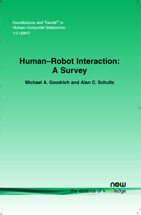Human–Robot Interaction: A Survey
By Michael A. Goodrich, Brigham Young University, USA, mike@cs.byu.edu | Alan C. Schultz, US Naval Research Laboratory, USA, schultz@aic.nrl.navy.mil
Abstract
Human–Robot Interaction (HRI) has recently received considerable attention in the academic community, in labs, in technology companies, and through the media. Because of this attention, it is desirable to present a survey of HRI to serve as a tutorial to people outside the field and to promote discussion of a unified vision of HRI within the field. The goal of this review is to present a unified treatment of HRI-related problems, to identify key themes, and discuss challenge problems that are likely to shape the field in the near future. Although the review follows a survey structure, the goal of presenting a coherent "story" of HRI means that there are necessarily some well-written, intriguing, and influential papers that are not referenced. Instead of trying to survey every paper, we describe the HRI story from multiple perspectives with an eye toward identifying themes that cross applications. The survey attempts to include papers that represent a fair cross section of the universities, government efforts, industry labs, and countries that contribute to HRI, and a cross section of the disciplines that contribute to the field, such as human, factors, robotics, cognitive psychology, and design.
Human-Robot Interaction
Human-Robot Interaction: A Survey presents a unified treatment of HRI-related issues, identifies key themes, and discusses challenge problems that are likely to shape the field in the near future. The authors describe the HRI story from multiple perspectives with an eye toward identifying themes that cross applications. The survey includes research results from a cross section of the universities, government efforts, industry labs, and countries that contribute to HRI, and a cross section of the disciplines that contribute to the field, such as human factors, robotics, cognitive psychology and design. Human-Robot Interaction: A Survey starts out by tracing the early history of robotics and human-machine interaction and the emergence of HRI as a field in its own right. It goes on to discuss what defines an HRI problem and to survey the kinds of problems encountered. The final two sections focus on the accepted practices, challenge problems and solution themes that have emerged as the field has matured. It concludes with a section on how HRI research ties in with work in other scientific fields. Human-Robot Interaction: A Survey is both an ideal tutorial for people outside the field and a timely addition to the current literature within the field which is intended to promote discussion of a unified vision of HRI
